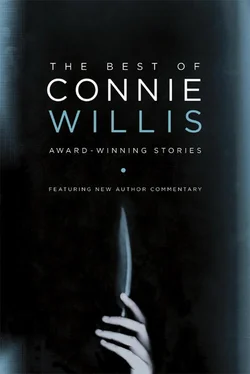Nothing is saved forever, Dean Matthews, and I knew that when I walked in the west doors that first day, blinking into the gloom, but it is pretty bad nevertheless. Standing here knee-deep in rubble out of which I will not be able to dig any folding chairs or friends, knowing that Langby died thinking I was a Nazi spy, knowing that Enola came one day and I wasn’t there. It’s pretty bad.
But it is not as bad as it could be. They are both dead, and Dean Matthews, too, but they died without knowing what I knew all along, what sent me to my knees in the Whispering Gallery, sick with grief and guilt: that in the end none of us saved St. Paul’s. And Langby cannot turn to me, stunned and sick at heart, and say, “Who did this? Your friends the Nazis?” And I would have to say, “No, the communists.” That would be the worst.
I have come back to the room and let Kivrin smear more salve on my hands. She wants me to get some sleep. I know I should pack and get gone. It will be humiliating to have them come and throw me out, but I do not have the strength to fight her. She looks so much like Enola.
January 1 —I have apparently slept not only through the night, but through the morning mail drop as well. When I woke up just now, I found Kivrin sitting on the end of the bed holding an envelope. “Your exam results came,” she said.
I put my arm over my eyes. “They can be marvelously efficient when they want to, can’t they?”
“Yes,” Kivrin said.
“Well, let’s see it,” I said, sitting up. “How long do I have before they come and throw me out?”
She handed the flimsy computer envelope to me. I tore it along the perforation. “Wait,” she said. “Before you open it, I want to say something.” She put her hand gently on my burns. “You’re wrong about the history department. They’re very good.”
It was not exactly what I expected her to say. “‘Good’ is not the word I’d use to describe Dunworthy,” I said and yanked the inside slip free.
Kivrin’s look did not change, not even when I sat there with the printout on my knees where she could surely see it.
“Well,” I said.
The slip was hand-signed by the esteemed Dunworthy. I have taken a first. With honors.
January 2 —Two things came in the mail today. One was Kivrin’s assignment. The history department thinks of everything—even to keeping her here long enough to nursemaid me, even to coming up with a prefabricated trial by fire to send their history majors through.
I think I wanted to believe that was what they had done, Enola and Langby only hired actors, the cat a clever android with its clockwork innards taken out for the final effect, not so much because I wanted to believe Dunworthy was not good at all, but because then I would not have this nagging pain at not knowing what had happened to them.
“You said your practicum was England in 1300?” I said, watching her as suspiciously as I had watched Langby.
“1348,” she said, and her face went slack with memory. “The plague year.”
“My God,” I said. “How could they do that? The plague’s a ten.”
“I have a natural immunity,” she said, and looked at her hands.
Because I could not think of anything to say, I opened the other piece of mail. It was a report on Enola. Computer-printed, facts and dates and statistics, all the numbers the history department so dearly loves, but it told me what I thought I would have to go without knowing: that she had gotten over her cold and survived the Blitz. Young Tom had been killed in the Baedeker raids on Bath, but Enola had lived until 2015, the year before they blew up St. Paul’s.
I don’t know whether I believe the report or not, but it does not matter. It is, like Langby’s reading aloud to the old man, a simple act of human kindness. They think of everything.
Not quite. They did not tell me what happened to Langby. But I find as I write this that I already know: I saved his life. It does not seem to matter that he might have died in hospital next day, and I find, in spite of all the hard lessons the history department has tried to teach me, I do not quite believe this one: that nothing is saved forever. It seems to me that perhaps Langby is.
January 3 —I went to see Dunworthy today. I don’t know what I intended to say—some pompous drivel about my willingness to serve in the fire watch of history, standing guard against the falling incendiaries of the human heart, silent and saintly.
But he blinked at me nearsightedly across his desk, and it seemed to me that he was blinking at that last bright image of St. Paul’s in sunlight before it was gone forever and that he knew better than anyone that the past cannot be saved, and I said instead, “I’m sorry that I broke your glasses, sir.”
“How did you like St. Paul’s?” he said, and like my first meeting with Enola, I felt I must be somehow reading the signals all wrong, that he was not feeling loss, but something quite different.
“I loved it, sir,” I said.
“Yes,” he said. “So do I.”
Dean Matthews is wrong. I have fought with memory my whole practicum only to find that it is not the enemy at all, and being an historian is not some saintly burden after all. Because Dunworthy is not blinking against the fatal sunlight of the last morning, but into the gloom of that first afternoon, looking in the great west doors of St. Paul’s at what is, like Langby, like all of it, every moment, in us, saved forever.
Afterword for “Fire Watch”

Like John Bartholomew, I fell in love with St. Paul’s Cathedral the moment I stepped through the west door and saw the church in all its sunny, high-arched golden glory.
I had heard about the fire watch, but didn’t know all that much about it. The note I’d written in the notebook I took with me on the trip said simply, “The priests used to sleep in the crypt of St. Paul’s during the Blitz to put out the fires as they started,” and underneath it the words “Here we lie,” the first line of a poem I had thought I might write from the viewpoint of the earlier heroes who lay buried in St. Paul’s—Nelson and Wellington and General Gordon—commenting on their modern-day counterparts.
But when I actually saw the cathedral and learned how near it had come to being destroyed, I knew I had to write the story that eventually became “Fire Watch.”
“Go away,” I told my husband and the friends we’d come to England with. “Go have tea or something. I need to get this all down,” and for the next two hours frantically took notes on everything I might possibly need: the layout of the crypt, the number of steps up to the Whispering Gallery, the locations of the chapels and The Light of the World and Nelson’s tomb. And then I went home and researched everything I could find about the war and the cathedral and the fire watchers.
I used to tell people that this was when I fell in love with the London Blitz, too, but a few years ago I happened upon a book and realized that that wasn’t true, that my fascination with the Blitz had actually begun much earlier.
The book was Rumer Godden’s An Episode of Sparrows , which my eighth-grade teacher, Mrs. Werner, had read aloud to us every day after lunch. It’s not really a YA sort of book, and I have no idea why she read it to us, except probably for the best of all reasons—because she liked it herself. And I have no memory of how the other kids in the class responded to it. But I loved it.
It’s the story of a little girl, Lovejoy Mason, who plants a garden in the bombed-out rubble of a London church, and many years and readings later, it finally dawned on me that it’s a modern retelling of Frances Hodgson Burnett’s A Secret Garden .
Читать дальше













